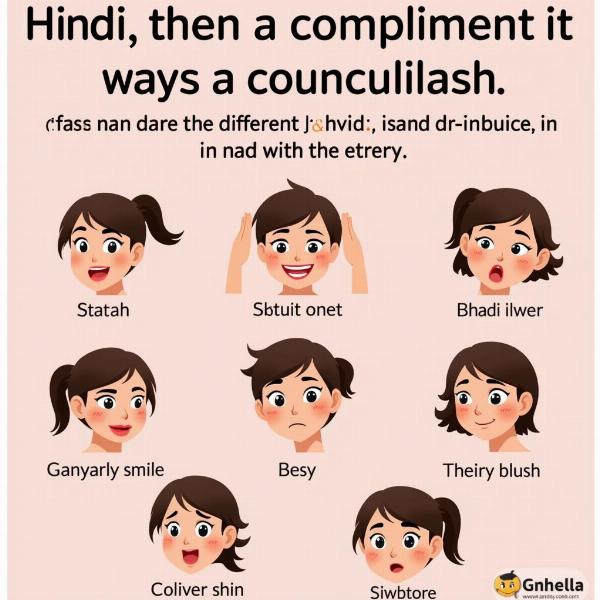Understanding what someone means when they say “you look like” requires more than just a literal translation. It’s about grasping the cultural context, the unspoken implications, and the subtle nuances that shape the meaning in Hindi. This phrase, seemingly simple, can express a wide range of sentiments, from admiration and concern to playful teasing and even disapproval. “You look like meaning in Hindi” is therefore a complex topic, depending heavily on the situation and the accompanying words.
Decoding “You Look Like” in Different Contexts
“You look like” in English often acts as a precursor to a comparison. In Hindi, this comparison can be expressed in various ways, each with its own shade of meaning. For example, “tum jaise lag rahe ho” (तुम जैसे लग रहे हो) is a common construction, where the blank is filled with the person or thing being compared. This structure directly translates to “you look like _____.” However, the specific Hindi word chosen to replace “look like” can alter the overall meaning. Words like “dikh rahe ho” (दिख रहे हो) emphasize appearance, while “lag rahe ho” (लग रहे हो) focus more on the impression someone gives.
Expressing Resemblance to a Person
When comparing someone to another person, the sentence structure remains similar. For instance, “You look like your mother” would translate to “Tum apni maa jaisi lag rahi ho” (तुम अपनी माँ जैसी लग रही हो) for a female subject, or “Tum apne pita jaise lag rahe ho” (तुम अपने पिता जैसे लग रहे हो) for a male subject. The word “jaisa/jaisi” (जैसा/जैसी) denotes resemblance.
Describing a State of Being
The phrase “you look like” can also describe someone’s state of being. “You look tired” could be expressed as “Tum thak gaye lag rahe ho” (तुम थक गए लग रहे हो). Here, the focus shifts from physical resemblance to perceived condition. The choice of words reflects the speaker’s observation of the other person’s demeanor and overall impression.
You Look Like an Angel: Exploring Compliments
Compliments using “you look like” often involve comparisons to positive figures or desirable qualities. “You look like an angel” is a classic example. In Hindi, this could be expressed as “Tum ek devi jaisi lag rahi ho” (तुम एक देवी जैसी लग रही हो) for a female, or “Tum ek dev jaise lag rahe ho” (तुम एक देव जैसे लग रहे हो) for a male. These translations use “devi” (देवी) and “dev” (देव), which mean goddess and god respectively, conveying a sense of divine beauty and grace. you look like an angel meaning in hindi dives deeper into this specific phrase.
Beyond Literal Translations: Cultural Sensitivity
Directly translating compliments can sometimes lead to awkwardness or misinterpretations. It’s crucial to be mindful of cultural sensitivities. While comparing someone to a deity might be acceptable in some contexts, it could be considered inappropriate in others. Therefore, understanding the cultural nuances surrounding compliments is vital for effective communication.
Negative Connotations: Addressing Concerns
“You look like” can also express concern or disapproval. “You look like you’ve seen a ghost” might be translated as “Tum bhoot dekh kar aaye ho jaise lag rahe ho” (तुम भूत देख कर आए हो जैसे लग रहे हो). This phrase implies shock or fear. Understanding these negative connotations is just as important as understanding the positive ones.
“You Look Like You’re Sick”: Expressing Worry
Expressing concern about someone’s health is common. “You look like you’re sick” can be conveyed as “Tum bimaar lag rahe ho” (तुम बीमार लग रहे हो). This direct expression clearly communicates worry and prompts further inquiry about the person’s well-being. hindi meaning of metaphor can provide further insight into figurative language used in such expressions.
Conclusion: Mastering the Nuances of “You Look Like” in Hindi
“You look like meaning in Hindi” is not a simple one-to-one translation. It encompasses a spectrum of meanings influenced by context, tone, and cultural nuances. From expressing admiration and concern to delivering compliments and criticisms, mastering the various ways to convey “you look like” in Hindi is essential for effective and sensitive communication. your my everything meaning in hindi and meaning of comfort in hindi explore other nuanced phrases that can enhance your understanding of Hindi.
FAQs
-
How do I say “You look like a movie star” in Hindi? You could say “Tum film star jaise lag rahe ho” (तुम फ़िल्म स्टार जैसे लग रहे हो).
-
Is it appropriate to compare someone to a deity in Hindi? It depends on the context and your relationship with the person. While sometimes acceptable, it can also be inappropriate.
-
What’s the difference between “dikhna” (दिखना) and “lagna” (लगना) when talking about appearance? “Dikhna” emphasizes visual appearance, while “lagna” focuses on the overall impression.
-
How can I express concern about someone’s appearance without being offensive? Choose your words carefully and consider the cultural context. A simple “Tum theek ho?” (तुम ठीक हो?) meaning “Are you alright?” can be a good starting point.
-
Are there different ways to say “you look beautiful” in Hindi? Yes, there are many, including “Tum sundar lag rahi ho” (तुम सुंदर लग रही हो) or “Tum khoobsurat lag rahi ho” (तुम खूबसूरत लग रही हो). marinate meaning in hindi demonstrates another example of how seemingly simple words can have varying meanings.
 Different Ways to Express Compliments in Hindi
Different Ways to Express Compliments in Hindi
Meaning-Hindi.in is your trusted partner for all your Hindi translation needs. We offer a comprehensive range of services, including business and commercial document translation, certified and legal document translation, technical and user manual translation, website and localization services, and academic translation. We specialize in delivering accurate, culturally sensitive, and high-quality translations tailored to your specific requirements. Contact us today for a free quote at [email protected] or call us at +91 11-4502-7584. Meaning-Hindi.in is committed to bridging the language gap and facilitating seamless communication.